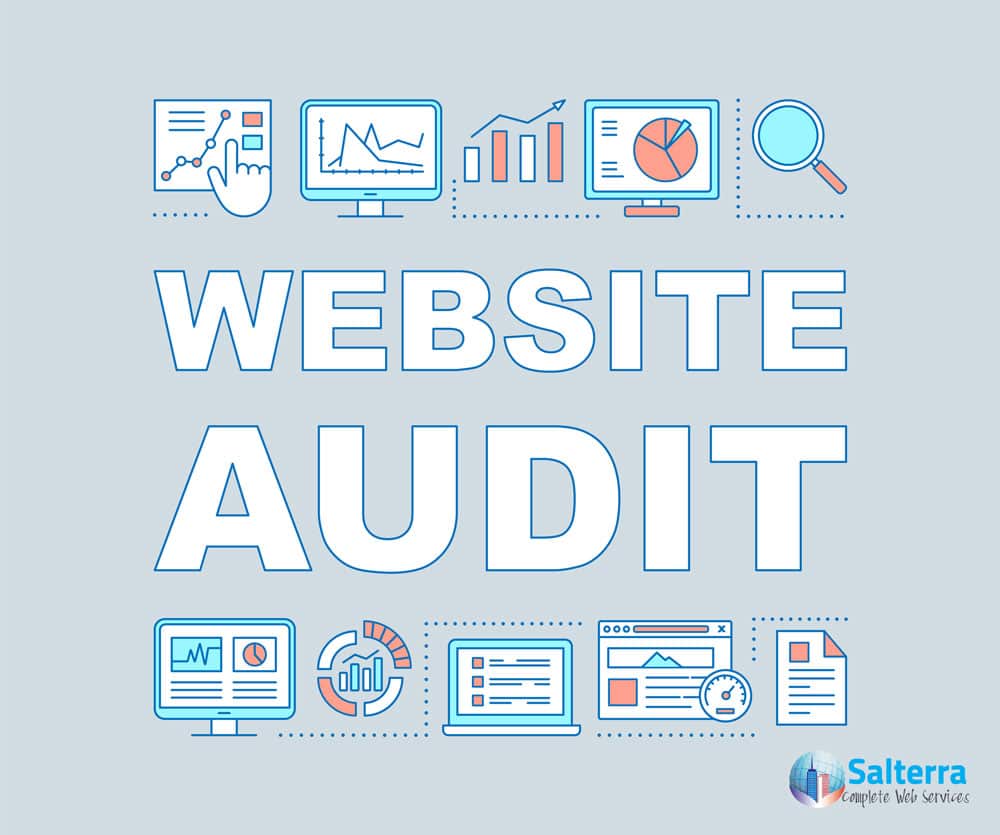
Why Conduct a Website Audit?
In today’s digital landscape, a website is the cornerstone of your online presence. Ensuring that your website is visually appealing and technically optimized for maximum performance is essential. This is where a comprehensive website audit comes into play. A website audit thoroughly evaluates your website’s performance, structure, content, and user experience. It provides a detailed analysis of your website’s strengths and weaknesses, helping you identify areas for improvement and unleash its full potential.
Website audits are not a one-time task but an ongoing process that should be conducted periodically to keep your website optimized, up-to-date, and aligned with industry best practices. Let’s delve deeper into the key benefits of running a website audit and how it can elevate your online presence.
- Uncovering Hidden Issues: A website audit digs deep into the technical aspects of your website, such as site speed, mobile responsiveness, and code optimization. It helps uncover hidden issues hindering your website’s performance, such as broken links, duplicate content, or poor navigation. Addressing these issues can improve user experience, reduce bounce rates, and enhance website functionality.
- Identifying SEO Opportunities: Search engine optimization (SEO) is crucial for driving organic traffic to your website. An audit analyzes your website’s SEO elements, including keyword usage, meta tags, and on-page optimization. It identifies areas where you can improve your SEO strategy to rank higher in search engine results pages (SERPs) and attract more targeted traffic. By aligning your website with SEO best practices, you increase your chances of being discovered by potential customers.
- Enhancing User Experience: User experience (UX) is vital to website performance. A website audit assesses your website’s usability, navigation, and overall design to ensure a seamless and intuitive experience for visitors. By optimizing your website for UX, you create a positive impression, increase engagement, and encourage visitors to stay longer, explore more pages, and convert into customers.
- Content Evaluation: Content is the heart of any successful website. A website audit evaluates your content quality, relevance, and optimization. It helps you identify gaps or areas where content can be enhanced to better align with your target audience’s needs and search intent. You can establish authority, engage your audience, and drive more conversions by delivering valuable and optimized content.
- Maximizing Conversions: A website audit examines your conversion funnels, landing pages, and calls to action to ensure they are optimized for maximum conversions. It helps identify any barriers or friction points in the user journey and provides recommendations to improve your website’s conversion rates. By fine-tuning your conversion elements, you can more effectively guide visitors through the sales funnel and increase your overall conversion rates.
A comprehensive website audit is invaluable for optimizing your online presence, driving better rankings, attracting targeted traffic, and increasing conversions. By conducting regular website audits, you can identify and address issues hindering your website’s performance and take advantage of growth opportunities. Remember, a website audit is not just a one-time task but an ongoing process to ensure your website remains competitive in the ever-evolving digital landscape.
Investing in a thorough website audit helps improve your website’s visibility and performance, enhances user experience, boosts conversions, and drives business growth.
Website Audits by Salterra Digital Services
An audit of a website is a comprehensive examination and evaluation of a website’s performance, usability, design, content, and technical aspects. The audit aims to identify improvement areas, uncover issues, and develop a strategy to optimize the website for better user experience, engagement, and search engine rankings. Web developers, digital marketers, and SEO experts often perform a website audit.
Here are the critical components of a website audit:
- Technical Audit: This involves analyzing the website’s technical performance, including page loading speed, mobile responsiveness, site architecture, crawlability, indexability, and errors like broken links or 404 pages. It also includes assessing website security, SSL certificates, and the proper use of redirects.
- On-Page SEO Audit: This examines the website’s content and its optimization for search engines. Key evaluation factors include metadata (title tags, meta descriptions), heading structure, keyword usage, URL structure, image optimization, and internal linking.
- Off-Page SEO Audit: This focuses on the website’s external factors influencing search engine rankings, such as backlinks, domain authority, and social media presence. Analyzing the website’s backlink profile and identifying toxic or low-quality links is crucial for maintaining a healthy website reputation.
- Content Audit: This evaluates the website’s content’s quality, relevance, and organization. It checks for duplicate content, proper formatting, readability, and content gaps. Assessing the performance of individual pages, such as their bounce rate and time spent on the page, can help identify areas for improvement.
- User Experience (UX) Audit: This involves analyzing the website’s design and layout to ensure it provides users with an intuitive and enjoyable experience. UX audit includes assessing navigation, mobile-friendliness, readability, visual hierarchy, and call-to-action (CTA) effectiveness.
- Conversion Rate Optimization (CRO) Audit: This focuses on how well the website is designed to convert visitors into customers or subscribers. It involves evaluating the effectiveness of CTAs, analyzing user flows, and identifying obstacles preventing users from taking desired actions.
- Accessibility Audit: This evaluates whether the website is accessible to people with disabilities, adhering to the Web Content Accessibility Guidelines (WCAG). This includes checking for appropriate text contrast, alternative text for images, and the correct use of semantic HTML.
- Competitor Analysis: This involves comparing the website to its competitors to identify areas where it might be underperforming or find opportunities for improvement and growth.
After the audit, a report is generated highlighting the findings, recommendations, and an action plan for addressing the identified issues and enhancing the website’s overall performance. Regular website audits are essential to maintain optimal performance, stay ahead of the competition, and adapt to the ever-evolving digital landscape.
FAQ about Auditing a Website
Why is a website audit important?
A website audit is important because it helps identify areas of improvement, uncover issues, and optimize the website for better user experience, engagement, and search engine rankings. Regular audits ensure your website stays up-to-date with the latest best practices and trends in web development, design, and digital marketing.
How often should I perform a website audit?
The frequency of a website audit depends on the size and complexity of your website, as well as the rate of change in your industry and the competitive landscape. However, a general recommendation is to perform a comprehensive website audit at least once a year. For more critical aspects like technical performance and SEO, you may want to conduct audits more frequently, such as every quarter or six months.
Can I perform a website audit, or must I hire a professional?
While conducting a basic website audit using available online tools and resources is possible, hiring a professional with expertise in web development, design, and digital marketing can provide more in-depth analysis, uncover hidden issues, and ensure that your website complies with the latest best practices. Professionals can also help develop a tailored action plan to address the identified issues and improve the overall performance of your website.
What tools can be used for conducting a website audit?
There are numerous tools available for different aspects of a website audit. Some popular tools include:
- Google Analytics and Google Search Console for tracking website performance and user behavior.
- Screaming Frog SEO Spider or Sitebulb for crawling and analyzing technical and on-page SEO factors.
- Ahrefs, Moz, or SEMrush for examining off-page SEO factors like backlinks and domain authority.
- GTmetrix or PageSpeed Insights for evaluating website speed and performance.
- WAVE or Siteimprove for assessing website accessibility.
What should I do after completing a website audit?
After completing a website audit, you should review the findings and prioritize the issues based on their impact on your website’s performance, user experience, and search engine rankings. Develop an action plan to address the problems identified and set realistic timelines for implementing the changes. Monitor your website’s performance regularly to assess the implemented changes’ effectiveness and identify any new issues that may arise.
What Situations Come up where I would need to audit my website?
You may need to audit your website in several situations to ensure optimal performance, user experience, and search engine visibility. Some of these situations include:
Website Redesign or Migration:
If you plan to redesign your website or migrate it to a new platform or domain, it’s crucial to audit the site before and after the migration. This will help you identify potential issues, ensure a smooth transition, and maintain your search engine rankings.
Search Engine Algorithm Updates:
Search engines like Google frequently update their algorithms, which may affect your website’s visibility and rankings. Conducting an audit after major algorithm updates can help you identify changes impacting your website and make necessary adjustments to align with best practices.
A decline in Website Performance:
Suppose you notice a sudden or gradual decline in your website’s performance, such as decreased traffic, lower search engine rankings, or higher bounce rates. In that case, an audit can help identify the underlying issues and provide insights for improvement.
Changes in Business Goals or Strategy:
If your business goals or marketing strategy have changed, you must audit your website to ensure it aligns with your new objectives. This includes revising your content, optimizing your website for new target keywords, and ensuring your website’s structure supports your updated goals.
Expansion into New Markets or Target Audiences:
When expanding your business into new markets or targeting new audience segments, an audit can help you tailor your website’s content, design, and user experience to better cater to the needs and preferences of your new audience.
Launching New Products or Services:
If you’re introducing new products or services, auditing your website ensures that the new offerings are integrated seamlessly and that your website is optimized to promote and support them effectively.
User Experience (UX) Issues:
Receive feedback from users about difficulties navigating your website or poor user experience. An audit can help you identify the problems and make necessary improvements to enhance the overall user experience.
Website Security Concerns:
If you suspect your website has been compromised or has security vulnerabilities, an audit can help identify potential issues and ensure that your site is protected from cyber threats.
Compliance with Accessibility and Legal Requirements:
Suppose your website needs to comply with accessibility guidelines like WCAG or legal regulations like GDPR. In that case, an audit can help ensure that your website meets these standards and minimizes the risk of penalties or legal issues.
By regularly auditing your website in these situations, you can maintain its performance, user experience, and search engine rankings and adapt it to the ever-evolving digital landscape.





